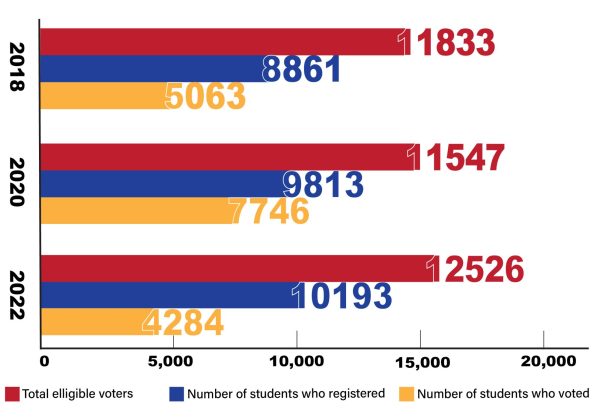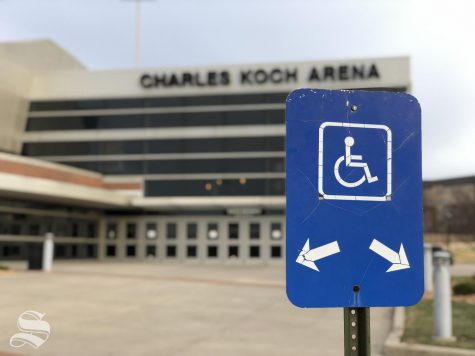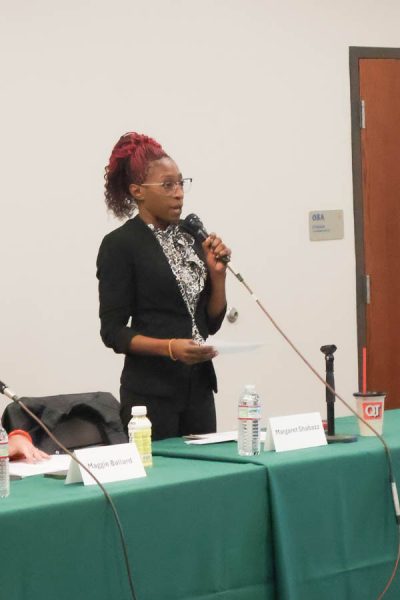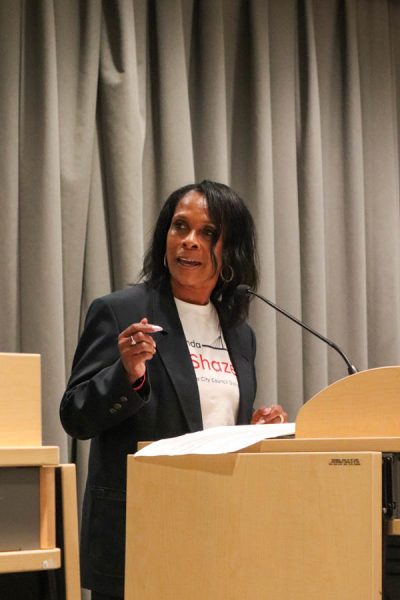Housing increase proposed for next year, shortage addressed
An employee at The Flats reported that mulch on the west end of the building was smoldering Saturday afternoon.
Last week, the university proposed increased housing rates for next school year. Scott Jensen, director of housing and residence life, spoke to the Student Senate Wednesday, addressing the proposed housing rates and the university’s progress on the housing shortage that resulted from the decision to close Fairmount Towers in July.
About 300 students were moved from Fairmount Towers, a university dorm, to The Flats, an apartment complex on Innovation Campus owned by MWCB, LLC.
Students who were moved from Fairmount Towers to The Flats paid the Fairmount rate for this school year — $2,190 a semester for a double room or $2,950 for a single room.
The proposed rates for The Flats next year are $4,150 a semester for a two-bedroom apartment and $4,500 for a one-bedroom apartment.
The proposal also states that students living at The Flats will be required to purchase a meal plan next year. Currently, only Shocker Hall residents are required to purchase a meal plan.
An unlimited access meal plan currently costs $2,030 a semester. The proposed cost for the same meal plan next year is $2,165 — a 6.65 percent increase from this year.
Shocker Hall rates would also rise with the new proposal. Currently, a single one-bedroom suite costs $4,325 a semester. Next semester, the same room would cost $4,455, a 3.01 percent increase.
The proposed housing rates have not yet been approved by the Kansas Board Regents.
Jensen also addressed the fate of Fairmount Towers, which the university has said will eventually be demolished.
“Our current plan is to continue to maintain it so that it does not become an eyesore,” Jensen said. “We will continue to try and make it look good until a decision is made by the university.”
The Housing and Residence Life Office is moving from its current location in Fairmount Towers to The Flats in about two weeks, Jensen said.
Jensen said the university is still dealing with excess occupancy that resulted from a decision made in July to move about 300 students from Fairmount Towers to The Flats.
As of August, 80 students were living in “temporary arrangements” in Shocker Hall, a process known as tripling. These arrangements consisted of adding an extra bed to the common area of a suite or a private bedroom.
Jensen said the university allowed students to move from Shocker Hall into Greek houses earlier than usual and waived the cancellation fee to deal with the housing shortage.
Despite the university’s efforts, there are still about 40 too many students living in Shocker Hall, Jensen said.
“Un-tripling rooms is tricky for us because we would like to un-triple them, but to make space, it means someone leaves the university, which we don’t want, or we have some folks who move off campus.”
Students affected by the housing shortage in Shocker Hall were originally given a 20 percent discount on their rent.
Jensen said the university plans to increase the discount to students who still live in over-occupied rooms.
“The folks who have had people longer will get a higher percent off. They may get 25 percent off,” Jensen said. “We anticipated that, by this point, we would have no one left.”
Teri Hall, vice president for student affairs, said in August that rooms would be de-tripled as soon as possible.
“Sadly, it means someone will have to leave to make a space. By the end of the semester, if not by October, we should have all rooms de-tripled,” Hall said in August.
Jensen said the university is trying to make amends for the inconveniences.
“It’s not about making money off of this,” Jensen said.
“It’s about what we do when it wasn’t the experience people thought they would have when they began.”

Jenna Farhat was the news editor of The Sunflower. Farhat majored in creative writing.












Murfin and MWCB • Oct 10, 2017 at 11:06 am
Great story in the Eagle to help shed light in the dark.
http://www.kansas.com/news/local/education/article178028506.html
Steve • Oct 10, 2017 at 11:04 am
I cannot in good conscience recommend WSU as a place to go to school anymore. If you are a 1st generation, local or commuter student dealing with budget concerns go to Butler CC and transfer to K State or KU instead. If you have money to spend why settle for WSU? The current WSU marketing plan makes no sense to me, I fail to see their position in the market. Too expensive to be affordable and not prestigious enough to be expensive. I see WSU entering into a period of steep decline if Bardo is not removed. WSU will be the size of Pitt State if things don’t change ASAP.
Steve • Oct 9, 2017 at 3:45 pm
If Bardo thinks he is going to grow enrollment at WSU by raising prices, he is delusional. Right now it would cost an in-state student about 20-25k per year to attend WSU and live in the dorms. 100k to get a bachelor’s degree from a small state university is insane. The local commuter students that have always been the bulk of WSU’s enrollment can’t afford those prices. Where is Bardo and his team coming up with this stuff? Are they intentionally trying to kill WSU?
Plan • Oct 9, 2017 at 9:27 pm
Who is less likely to be able to pay the high costs that are now emerging at WSU? Yep. Past comments from Bardo indicated this was a desired outcome.
Fake Pres. Bardo • Oct 9, 2017 at 11:51 pm
Has any looked into out of state students earn more scolarships than in state students with the same GPA and ACT scores? What WSU is doing to would be wichita commuter students should be criminal. Why pay insane prices when you could pay the same insane prices and go to KU or KSU. Bardo and friends want the rich out of state students and in the process burning the less able 1st generation students. I imagine fort hays is cheaper than WSU. FHSU probably doesnt care what sport league they are in. Free market is telling us that the pathway to higher enrollment is through lower prices. WOW!! Doesnt take millions spent on advertising to far away places down i-whatever corridore to figure that one out.
Also if students want to work out why not work out in the hesket? Or just run on campus, why does an unproven 18 year old need fancy living arragements? They probably still have to master how to wash their clothes.
Why do we allow 18 year olds to borrow money to live in a bedroom with higher rent than their parents mortages when the student probably doesnt make enough to file taxes?
When was the last time you herd of an 18 year old make sound financial decisions when you wave 10s of thousands of dollars in their face of what appears to be an endless supply of cash, just in the form of studnet loans???? “Hey! Want to go to south padre? Sure why not. Just call up financial aid and tell them you are short on cash”. Ive seen kids do that, and finanncial aid doesnt even look, in those situations, if there is a balance on student accounts.
If the government deems you can borrow $25000 but school costs $20000 then the left over $5000 of elgibable borrowing is an entitlement. The govenment is stupid in its lending and universities are dummer for facilating it.
However because this lending exists, it’s in WSU’s best interest to charge as much as they want because uncle sam will provide students the money to do it.
Ever wonder why the nation has $1.4 trillon dollars of student loans? It’s partially because of university administrators who lack the integrity to say no to shiny new buildings and thinking they are worthy of large company CEO salaries. I believe this administrations is one of those lacking integrity.
Having a plan for change is nice, but not at the expense near doubling the cost of education. I believe living on campus the first year is truly benifical to graduate. But in the end, If 18 year olds are adults then why do they need so many administrators to manage their livelyhood?
As always,
Fake Pres. Bardo
Another Year Lease • Oct 9, 2017 at 2:35 pm
So there will be another year lease of The Flats? KBOR has to be involved in some manner….maybe…
And you are going to maintain Fairmount? For what?
Shannon • Oct 9, 2017 at 12:10 pm
You say it’s not about making money ok so grandfather in the students you made move this year from Fairmount Towers into the Flats. Give them the Fairmount Towers rate until they graduate. But no I am sure that won’t happen because then someone will loose out on money. Instead you are caussing un-needed stress on these students as to what they are going to do next year for somewhere to live. Are they nice yes but some students don’t care about that. They are there to get an education so they live where they can afford to live in order to do so. You guys keep saying you are making this a better college for these students, well the way I see it is that unless you come from a family with money and they can pay for all the extras out of pocket then that better college experience is not gonna happen at WSU. You are making it so hard for these kids to better themselves everyday with all the extras you are making them have and pay for.
Steve • Oct 9, 2017 at 10:24 am
I thought The Flats was supposed to be a private apartment building open to the public. Now WSU says that students must purchase a meal plan to live there? What happens to the students that can’t afford to pay double the rent next year, live off campus? The Flats was a scam from day one, it was designed to provide justification to demolish Fairmount so WSU could jack up the rents.
Shocker for life-or 4years, 8 months, 2 days... • Oct 9, 2017 at 8:58 am
I am confused. One of the primary selling points of The Flats is they are apartment style housing with all the bells and whistles including a fully-functioning kitchen in each unit-complete with granite counter tops!
Now individuals who decide to live in these apartments are also going to be required to purchase a meal-plan?
That would seem counter to one of the major selling points of these luxurious, student/community living options.
Any idea why?
Michael • Oct 10, 2017 at 12:59 pm
Quite simple really… Money